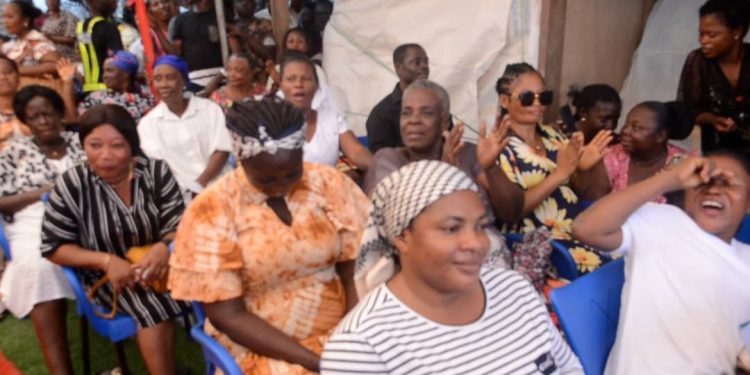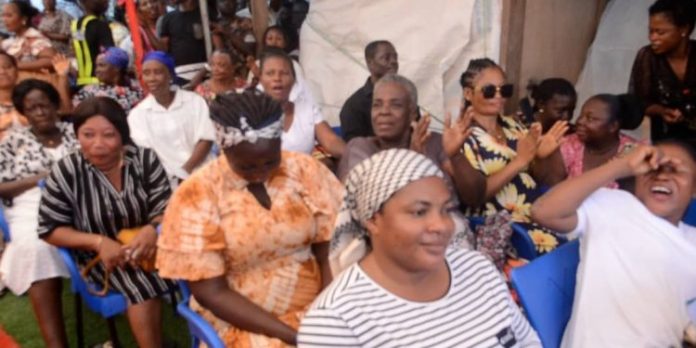
The government has directed the National Investment Bank (NIB) to extend financial support to traders who lost their shops and goods in the devastating Kantamanto Market fire, as part of efforts to help them recover and sustain their businesses.
The directive was announced at the official reopening of the market in Accra, months after a blaze on January 2 destroyed more than 7,000 shops and displaced over 30,000 traders, dealing a heavy blow to livelihoods and the local economy.
Speaking at the ceremony, Deputy Chief of Staff Nana Oye Bampoe Addo described Kantamanto Market as an economic powerhouse and an essential source of income for thousands of families across the country. She praised the traders for their determination to rebuild after the disaster.
“This market is more than a place of trade. It is the lifeline of thousands of Ghanaian families, the beating heart of business and commerce in Accra. Today, we salute you for your resilience.
We salute you for refusing to be defeated after the January 2nd fire and for choosing to rebuild Kantamanto, keeping the hope of 30,000 traders alive,” she said.
She added that President John Dramani Mahama and the government remain committed to supporting the traders to fully bounce back.
In addition to financial assistance from NIB, the government has assured that measures will be put in place to improve safety standards at the market and minimize the risk of future disasters.
Meanwhile, the General Secretary of the Kantamanto ‘Obroniwawu’ Businesses Association, Adutwum Atta Manu, commended The Or Foundation, a non-profit organization, for its intervention during the recovery process.
According to him, the Foundation has already donated 1,000 fire extinguishers to enhance safety and preparedness at the market.
He urged both government and private stakeholders to continue working together to safeguard the livelihoods of the thousands who depend on Kantamanto Market for survival.
The reopening marks a fresh chapter for the historic market, which remains one of the largest centers of trade in secondhand goods and textiles in West Africa, drawing buyers and sellers from across the region.
























































![[FREE FREE MONEY] Predict and Win a Guaranteed GH¢200 From Us EVERY WEEK](https://wordpress.ghanatalksradio.com/wp-content/uploads/2022/02/Predict-and-Win-Final-09-03-2021-218x150.jpg)
![[Predict & Win – 8th/Oct.] WIN A Guaranteed ¢200 From Us This Week](https://wordpress.ghanatalksradio.com/wp-content/uploads/2021/10/maxresdefault-16-218x150.jpg)
![[Predict & Win – 2nd] WIN A Guaranteed ¢200 From Us This Week](https://wordpress.ghanatalksradio.com/wp-content/uploads/2021/09/maxresdefault-50-218x150.jpg)
![[Predict & Win – 25th] WIN A Guaranteed ¢200 From Us This Week](https://wordpress.ghanatalksradio.com/wp-content/uploads/2021/09/maxresdefault-36-218x150.jpg)
![[Predict & Win – 18th] WIN A Guaranteed ¢200 From Us This Week](https://wordpress.ghanatalksradio.com/wp-content/uploads/2021/09/maxresdefault-23-218x150.jpg)












![[National cathedral] See full list of churches that have contributed since 2018](https://wordpress.ghanatalksradio.com/wp-content/uploads/2020/09/Ghana-National-Cathedral-GhanaTalksRadio-100x70.jpg)

![[WATCH] Ghana Newspaper Headlines – 16th March 2021](https://wordpress.ghanatalksradio.com/wp-content/uploads/2021/03/maxresdefault-19-100x70.jpg)
![[01/09/22] GTR NEWSPAPER HEADLINES: ECG Tariff Hike begins today and more..](https://wordpress.ghanatalksradio.com/wp-content/uploads/2022/09/sddefault-100x70.jpg)
